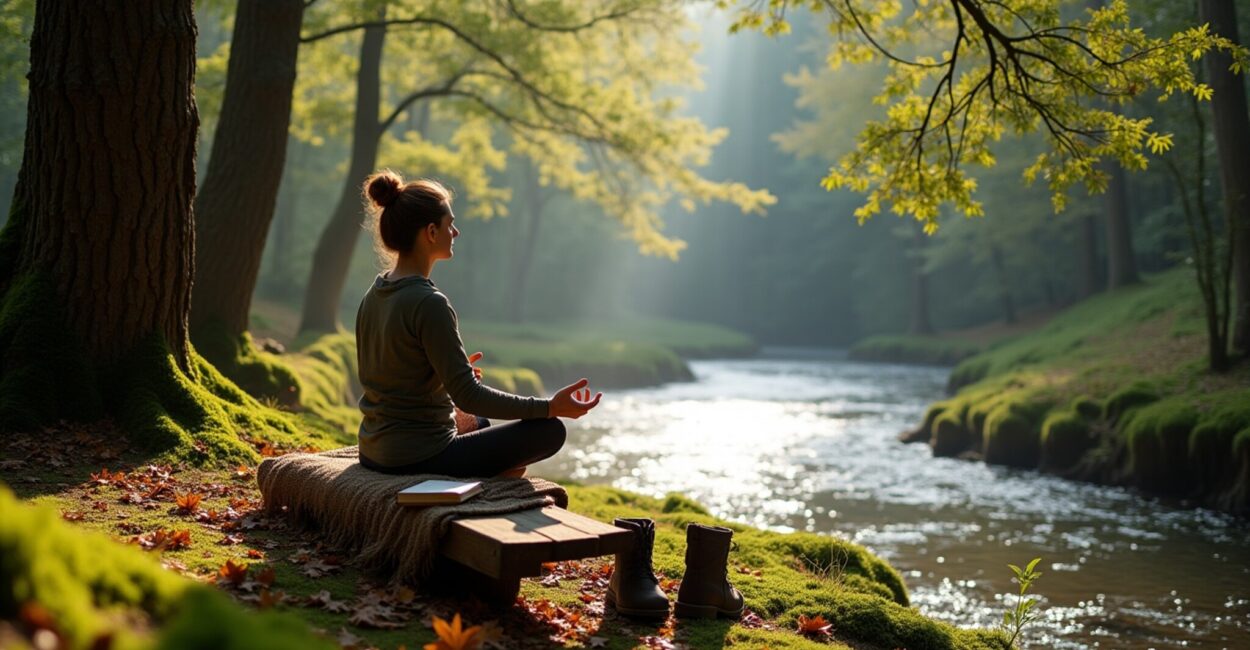Warning: Cannot modify header information - headers already sent in /home/u278635817/domains/mymorninglife.com/public_html/wp-content/plugins/artigosgpt/artigosgpt.php on line 29509
Warning: Cannot modify header information - headers already sent in /home/u278635817/domains/mymorninglife.com/public_html/wp-content/plugins/artigosgpt/artigosgpt.php on line 29509
Imagine stepping into a peaceful forest, where the rustle of leaves and the gentle whisper of the wind instantly calm your mind. This is the essence of nature therapy, an approach that harnesses the healing power of the natural world to enhance well-being and reduce anxiety. Spending time in nature isn’t just a pleasant escape; it’s a scientifically supported method for improving mental health, especially in rural settings where tranquility is abundant.
In today’s fast-paced, technology-driven world, anxiety and stress have become common companions. Nature therapy offers a refreshing antidote, reconnecting us with the earth’s rhythms and providing a sanctuary away from urban chaos. This article explores how immersing yourself in natural environments can transform your emotional state, boost your health, and provide long-lasting relief from anxiety.
Discover the surprising ways nature therapy works, practical steps to incorporate it into your life, and why rural settings amplify its benefits. Whether you live in the countryside or plan a retreat, this guide will deepen your understanding of nature’s therapeutic magic.
Contents
ToggleThe Science Behind Nature Therapy
How Nature Impacts the Brain
Nature therapy stimulates the brain’s parasympathetic nervous system, promoting relaxation and reducing stress hormones like cortisol. This calming effect helps alleviate anxiety symptoms naturally.
Studies show that exposure to natural settings improves mood, cognitive function, and emotional resilience, which are key for mental well-being.
Benefits for Mental Health
Regular immersion in nature lowers anxiety levels, eases depression, and enhances overall psychological well-being. It fosters a sense of peace and groundedness.
Nature therapy encourages mindfulness, helping individuals focus on the present moment and break free from negative thought cycles.
Physical Health Connections
Time outdoors increases physical activity, vitamin D absorption, and immune function, all contributing to better health and reduced anxiety.
Natural environments also improve sleep quality, which is essential for managing stress and emotional balance.
Why Rural Settings Amplify Nature Therapy
Tranquility and Reduced Noise Pollution
Rural areas offer quiet, undisturbed environments that enhance relaxation and mental clarity, unlike noisy urban spaces.
This peacefulness allows the mind to rest and recover from overstimulation, a key factor in reducing anxiety.
Access to Diverse Natural Landscapes
Rural settings provide access to forests, rivers, meadows, and hills, offering varied sensory experiences vital for a deep connection with nature.
These diverse habitats stimulate the senses and encourage exploration, which supports emotional healing.
Stronger Community and Social Connections
Smaller rural communities often foster closer social ties, which combined with nature therapy, create a supportive environment for mental health.
Positive social interactions in nature can reduce feelings of isolation and improve emotional well-being.
Simple Ways to Practice Nature Therapy Daily
Mindful Walks in Green Spaces
Take slow, intentional walks focusing on sights, sounds, and smells to ground yourself in the present.
This practice enhances mindfulness and deepens your connection to your surroundings.
Outdoor Meditation and Breathing Exercises
Find a quiet outdoor spot to practice deep breathing or meditation, reducing stress and anxiety instantly.
Nature’s calming backdrop supports concentration and emotional release.
Gardening and Hands-On Nature Interaction
Engage with soil, plants, or water through gardening to stimulate sensory awareness and promote relaxation.
These activities foster a nurturing connection with life and boost mental health.
Step-by-Step Guide to Starting Nature Therapy in Rural Areas
- Choose a nearby natural spot such as a forest, lake, or meadow.
- Set a regular schedule to spend at least 20 minutes there daily or weekly.
- Engage your senses: listen to birds, observe plants, and feel textures.
- Practice mindful walking or simple meditation to focus your mind.
- Keep a journal to reflect on how nature therapy affects your mood and anxiety.
- Gradually increase your outdoor time and explore new natural environments.
The Role of Nature Therapy in Reducing Anxiety
Interrupting the Anxiety Cycle
Nature therapy disrupts repetitive, anxious thoughts by shifting attention to calming natural stimuli.
This shift reduces the intensity and frequency of anxiety episodes over time.
Enhancing Emotional Regulation
Regular time outdoors improves the brain’s ability to manage emotions, helping individuals respond calmly to stressors.
Nature’s soothing presence supports resilience against anxiety triggers.
Building Long-Term Stress Resistance
Exposure to nature builds coping skills and strengthens psychological defenses against future stress.
This proactive approach reduces chronic anxiety and promotes sustained well-being.
Nature Therapy as a Complement to Traditional Treatments
Integrating with Therapy and Medication
Nature therapy can enhance the effects of counseling and medication by providing additional stress relief and grounding.
It is a safe, natural supplement that supports overall mental health treatment plans.
Encouraging Lifestyle Changes
Incorporating nature therapy motivates healthier habits, such as increased physical activity and better sleep routines.
These lifestyle improvements contribute to anxiety reduction and improved quality of life.
Accessible and Affordable Therapy Option
Nature therapy requires minimal cost and is accessible to many, especially in rural settings with abundant green spaces.
This makes it an inclusive option for mental health support worldwide.
Measuring the Impact of Nature Therapy
Tracking Emotional Changes
Use journals or apps to record mood shifts, anxiety levels, and stress reduction after nature sessions.
Regular tracking helps identify patterns and reinforces positive habits.
Physical Health Indicators
Monitor improvements in sleep quality, heart rate variability, and energy levels as signs of therapy effectiveness.
Physical health gains often correlate with reduced anxiety symptoms.
Feedback from Mental Health Professionals
Consult therapists or counselors to evaluate progress and adjust nature therapy practices for maximum benefit.
Professional input ensures a balanced and effective mental health plan.
| Aspect | Nature Therapy Benefit | Measurement Method |
|---|---|---|
| Mental Clarity | Improved focus and reduced rumination | Self-report scales, cognitive tests |
| Stress Hormone Levels | Lower cortisol and adrenaline | Saliva or blood tests |
| Sleep Quality | Deeper, more restful sleep | Sleep trackers, questionnaires |
| Anxiety Symptoms | Reduced frequency and intensity | Clinical assessments, self-report |
The Unique Emotional Connection of Nature Therapy
Feeling Part of Something Greater
Nature therapy fosters awe and gratitude, creating a profound sense of belonging beyond oneself.
This emotional uplift counters isolation and nurtures hope.
Rekindling Joy and Curiosity
Exploring natural environments sparks wonder and playfulness, boosting positive emotions.
These feelings help break the grip of anxiety and depression.
Developing Compassion and Patience
Interacting gently with nature encourages kindness toward oneself and others, softening harsh self-criticism.
This emotional growth supports long-term mental resilience.
Conclusion
Nature therapy is more than a trend; it’s a powerful, accessible path to healing the mind and body. By immersing yourself in rural landscapes, you tap into a natural sanctuary where anxiety fades and well-being flourishes. The calming rhythms of nature invite you to slow down, breathe deeply, and reconnect with your inner peace. Embracing this therapeutic connection can transform your life, offering a lasting refuge from the stress of modern living.
Remember the quiet forest, the gentle breeze, and the grounding earth beneath your feet—nature therapy is waiting to guide you back to balance and joy.
Frequently Asked Questions
What exactly is nature therapy?
Nature therapy is a therapeutic practice that involves spending time in natural environments to improve mental and physical health. It leverages the calming effects of nature to reduce symptoms of anxiety, stress, and depression, promoting overall well-being. This approach can include activities like walking, meditation, or gardening in outdoor settings.
How does nature therapy help reduce anxiety?
Nature therapy lowers anxiety by reducing stress hormones, encouraging mindfulness, and providing sensory experiences that distract from anxious thoughts. Being in calming natural surroundings helps regulate emotions and promotes relaxation, making it easier to manage anxiety symptoms effectively over time.
Can nature therapy replace traditional medical treatments?
Nature therapy complements but does not replace traditional treatments like medication or psychotherapy. It serves as a supportive addition that enhances overall mental health and accelerates recovery when used alongside professional care. Always consult a healthcare provider before making changes to treatment plans.
Why are rural settings better for nature therapy?
Rural settings offer quieter, less polluted, and more diverse natural environments that enhance the therapeutic effects of nature therapy. The abundance of green spaces and peaceful surroundings in rural areas provide ideal conditions for relaxation and emotional healing compared to urban environments.
How often should I practice nature therapy for best results?
Consistency is key. Spending at least 20 to 30 minutes in nature several times a week is recommended to gain significant benefits. Regular exposure helps build resilience, reduces anxiety, and promotes lasting improvements in well-being.
More Articles




























